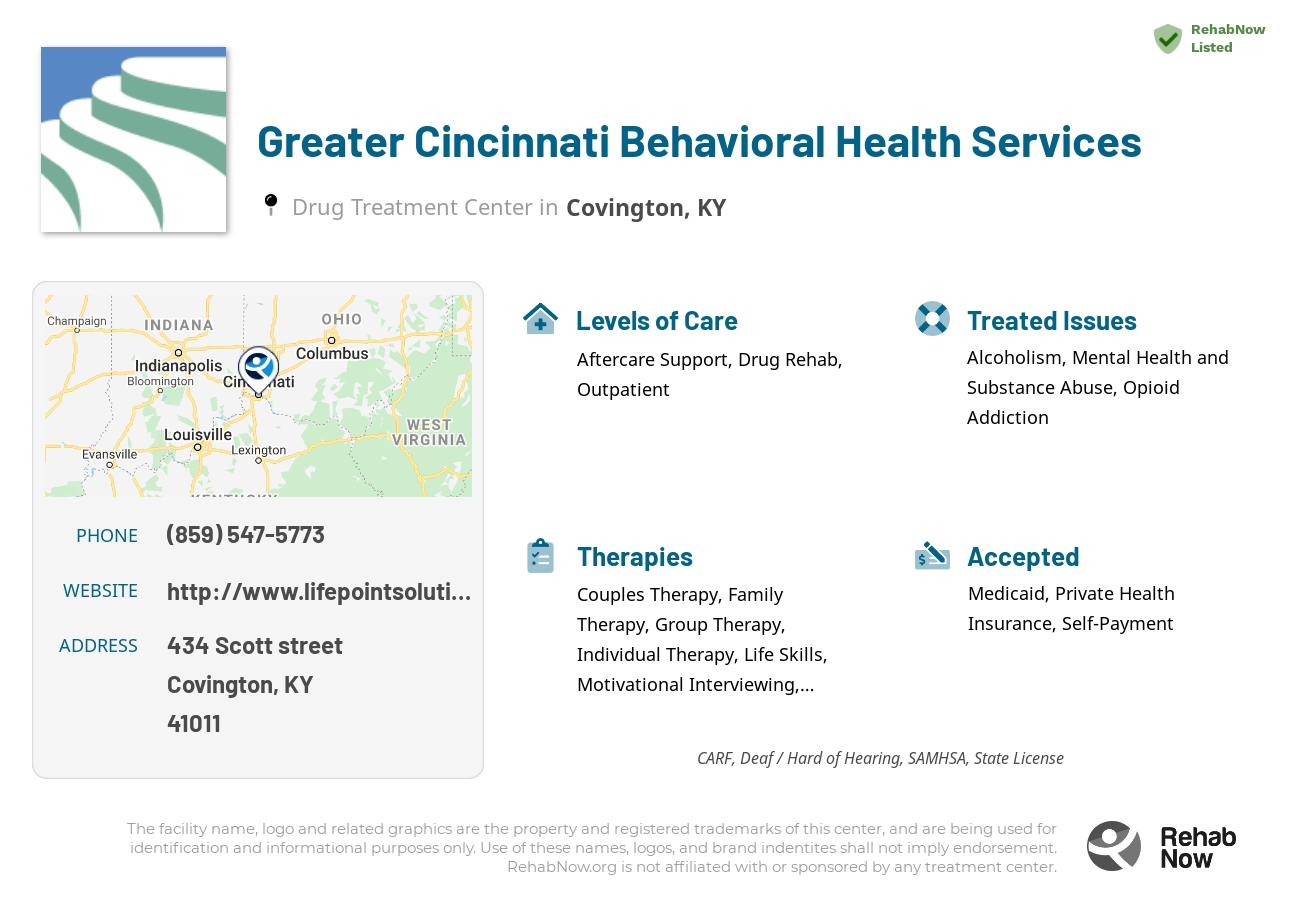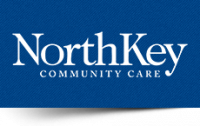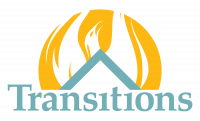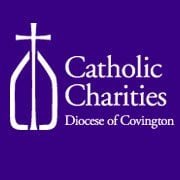Greater Cincinnati Behavioral Health Services
Drug Rehab Center in Covington, Kentucky
Greater Cincinnati Behavioral Health Services provides outpatient mental health and addiction services in the Greater Cincinnati area, offering a range of tailored behavioral health services including therapy, psychiatry, crisis support and outpatient substance use services, utilizing evidence-based treatments such as Cognitive Behavioral Therapy, Dialectical Behavior Therapy, and Motivational Interviewing, among others.
About Greater Cincinnati Behavioral Health Services in Kentucky
Greater Cincinnati Behavioral Health Services (GCBHS) is a non-profit organization based in Covington, Kentucky and provides outpatient mental health and addiction services for individuals, families and groups in the Greater Cincinnati area. GCBHS offers an extensive array of behavioral health services that are tailored to meet the needs of each customer. Their services include mental health assessments, individual and family therapy, counseling, psychiatry, crisis stabilization, and outpatient substance use services, among other treatments.
GCBHS offers a wide range of services to help people struggling with addiction, such as individual and family counseling, mental health assessments, and evidence-based treatment modalities, such as Cognitive Behavioral Therapy, Dialectical Behavior Therapy, and Motivational Interviewing, to name a few. Additionally, they offer group therapy, peer recovery, and relapse prevention services designed to help individuals build skills necessary to better manage their mental health, and substance use issues.
GCBHS is committed to providing high-quality and evidence-based treatments to their customers. The facility is JCAHO accredited, licensed by the Kentucky Department of Mental Health and Substance Abuse Services, and is a certified member of the National Association of Addiction Treatment Providers. Moreover, GCBHS is certified by the Ohio Department of Mental Health and Addiction Services and is a recipient of the Cincinnati Business Courier’s Corporate Caring Award for the category of non-profit organization for their exceptional services to their patients.
Genders
Ages
Modality
Additional
Accreditations
State License
SAMHSA

CARF
The Commission on Accreditation of Rehabilitation Facilities (CARF) is a non-profit organization that specifically accredits rehab organizations. Founded in 1966, CARF's, mission is to help service providers like rehab facilities maintain high standards of care.
Conditions and Issues Treated
Many people who struggle with opioid addiction need to attend specific programs like methadone , Suboxone or Vivitrol clinics.
These types of programs will provide the patient with legal, prescription medications that can help them overcome their cravings for illegal opioids like heroin or fentanyl . If the patient has a chronic condition like Hepatitis C, they must undergo treatment before they can begin taking these medications.
Levels of Care Offered
This center offers a variety of custom treatment tailored to individual recovery. Currently available are Aftercare Support, Drug Rehab, Outpatient, with additional therapies available as listed below.
An outpatient treatment program is set up to help with alcohol or drug addiction, or a co-occurring disorder. The patient must attend the Kentucky facility for their therapy and other programs but are able to return home each night. The frequency of mandatory attendance decreases after much of Greater Cincinnati Behavioral Health Services‘s program is complete.
Aftercare is a term that’s used to refer to any sort of continuing care offered for a drug addict who has voluntarily entered a rehabilitation program. This type of care can be provided in several settings, including outpatient therapy sessions after the addict has completed an inpatient program. There are also 12-step support groups, such as Alcoholics Anonymous, which can provide additional help for addicts trying to stay sober.
Therapies & Programs
Individual Therapy is a critical component of addiction recovery. Therapists work with patients to identify the root of their addiction and figure out how to better handle the issues that led to them using drugs. Individual Therapy is the one-on-one session where people meet with their therapist. Individual therapy provides a safe space for people to open up and discuss personal and sensitive topics which they may not feel comfortable discussing in a group setting.
Couples therapy at Greater Cincinnati Behavioral Health Services focuses on addiction treatment for the addict and their spouse. The addict’s family, not just the addict, can benefit from this form of therapy. Couples therapy addresses communication problems, trust issues, lack of intimacy, and abuse in intimate relationships. Couples therapy can help rebuild trust between partners, which increases the chances for successful treatment and sustained recovery.
Intimate relationships can be damaged during addiction, and professional help may be necessary to rebuild the often destroyed trust and love. Couples therapy at Greater Cincinnati Behavioral Health Services helps couples improve communication and rebuild trust. Either or both partners will be helped by this treatment administered by professionals. This treatment can also help one or both partners if addiction is the problem.
Family therapy will also help families realize that the addiction is not their fault. For many years, people blamed themselves for an addict’s behavior and felt that they had done something wrong. This is not the case. Addiction is a disease, and it can strike anyone, even if their life seems fine from the outside. It can bring a lot of shame to a family when they have an addict in their midst, but if everyone is open and honest with each other, then they can help everyone stay in recovery.
Group Therapy is utilized by drug treatment centers like Greater Cincinnati Behavioral Health Services to provide the recovering drug addict with a platform to talk about their feelings and experiences. It also provides for an opportunity to learn from other addicts who have successfully overcome their addiction.
Group Therapy is employed in lectures, seminars, or discussion groups (the latter two are typically conducted as “therapy groups”). It is recommended that all group members be recovering addicts for this type of therapy to work (though it does not exclude others with lived experience).
Trauma therapy is a clinical process that helps individuals deal with mental stress often caused by traumatic events. It is generally done for children, teenage victims of sexual assault, and war veterans. The therapist helps the person identify, understand and work through the problem. This is done with the help of talking about it in group or one-on-one counseling sessions. Therapists use relaxation, role-playing, art, and music to help the person open up about what is bothering them.
Cognitive behavioral therapy is also a popular service for individuals living with addiction. This type of supportive treatment uses both one-on-one counseling and group sessions to teach addicts how to identify thoughts, behaviors and emotions that might increase their risk of relapse.
These professionals can help addicts develop coping skills for managing stress, improving self-esteem and overcoming triggers. They might also use behavioral therapy to help addicts learn how to avoid cravings and warning signs that could lead them back into addiction.
Therapy can be used as a step-down from inpatient treatment or as the primary method of overcoming an addiction. No matter which option is best for the addict, they will teach important emotional coping techniques, which can make it easier for addicts to get through the tough days.
Training in improved life skills helps those recovering from addiction feel more capable of self-care. Greater Cincinnati Behavioral Health Services are daily skills that give the person the tools they need to survive.
The therapy covers practical activities like cooking, job hunting, social interaction, and money management, helping to fill in the knowledge gaps caused by addiction.
These life skills help the person self-manage their recovery and stay on track. It also reduces relapse risk as they gain confidence in their day-to-day abilities.
Payment Options Accepted
For specific insurance or payment methods please contact us.
Is your insurance accepted?
Ask an expert, call (888) 674-0062
Additional Details
Specifics, location, and helpful extra information.
Covington, Kentucky 41011 Phone Number(859) 547-5773 Meta DetailsUpdated November 25, 2023
Staff Verified
Greater Cincinnati Behavioral Health Services Patient Reviews
There are no reviews yet. Be the first one to write one.
Covington, Kentucky Addiction Information
Kentucky ranks among the top ten states for opioid-related overdoses. Most of these are due to heroin, fentanyl, and prescription opioid use. A little over 11% of the Kentucky population abuses alcohol in a given year. More than 15% of Kentucky adults admit to participating in binge drinking every month.
The drug addiction problem in Covington, Kentucky, is unfortunately quite bad. 10% of the population struggles with addiction in Covington. From 2014 to 2016, the number of admissions for treatment of heroin addiction increased by 87%. There are several different rehab facilities in Covington, Kentucky, that can help people struggling with addiction to get sober.
Treatment in Nearby Cities
- Barbourville, KY (157.2 mi.)
- Sandy Hook, KY (101.8 mi.)
- Wallingford, KY (67.5 mi.)
- Mayfield, KY (277.5 mi.)
- Ft Mitchell, KY (3.9 mi.)
Centers near Greater Cincinnati Behavioral Health Services
The facility name, logo and brand are the property and registered trademarks of Greater Cincinnati Behavioral Health Services, and are being used for identification and informational purposes only. Use of these names, logos and brands shall not imply endorsement. RehabNow.org is not affiliated with or sponsored by Greater Cincinnati Behavioral Health Services.











